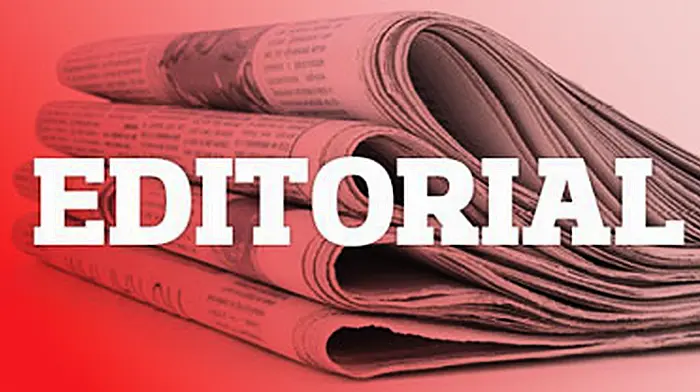ANNUS horribilis is probably the most apt way of describing 2020 in two words. It was indeed a horrible year, which was both unexpected and unprecedented, and was very much the proverbial year of two halves, one that saw the suppression of the coronavirus by the end of the first half of the year and its ominous resurgence in the latter half
Think back to this time last year when the Covid-19 virus was developing in China and we were still blissfully unaware of it, getting on with the excesses of the festive season and feeling sorry for ourselves after overdoing things. Many had the usual worries about how they were going to pay off the credit card bills at the end of January after overspending on the Christmas splurge.
We had the ’flu season kicking in, causing overcrowding in Emergency Departments across the country and the inevitable shortage of hospital beds as successive governments over many years – in spite of all their promises – still had not got to grips with this perennial problem. Then, the country was distracted from that by the earlier-than-expected announcement of a general election by then Taoiseach Leo Varadkar, a move he may have subsequently regretted because his Fine Gael party and their former confidence and supply agreement partners, Fianna Fáil, both lost seats in the polling as Sinn Féin – even to their own surprise – made huge gains and they could have had even more seats if they had run enough candidates, but then it is easy to be wise with the benefit of hindsight.
The election on February 8th relegated Fine Gael to third place behind Fianna Fáil and Sinn Féin in terms of numbers of seats won, which is what counts in doing the Dáil arithmetic, even though Mary Lou McDonald’s party got the most votes in the country but failed to maximise the number of seats they could have won off the back of such a mandate. As no combination of two of the three biggest parties added up to a Dáil majority, it fell to Fianna Fáil’s Micheál Martin, as leader of the party with – just marginally – the most seats, to seek further support to try to form a new government.
However, his options were limited as he refused to countenance going into coalition with Sinn Féin and Varadkar was talking about taking Fine Gael to the opposition benches. But then, just as what transpired to run to more than four months of tortuous talks on forming a government got under way in late February, fate intervened in a rather unexpected way.
Covid-19 came from China to Europe, via northern Italy, and quickly spread across Europe, reaching Ireland at the end of February and leading to an almost complete shutdown of the country from late-March in order to slow down the inevitable spread of the virus as new terms such as lockdown, social distancing, sanitising, cocooning and respiratory etiquette entered the lexicon. Embattled caretaker Taoiseach Leo Varadkar combined his nous as both a medical doctor and a politician to provide leadership and rehabilitate his reputation after his party’s electoral losses.
He faithfully followed the advice of chief medical officer Dr Tony Holohan and the National Public Health Emergency Team, knowing that when the public would eventually tire of dancing to their tune, he could blame NPHET, as he subsequently, hypocritically, did. Indeed, NPHET did fail to act quickly enough on nursing homes, which accounted for more than half of our fatalities from Covid-19. However, the restrictions imposed in the second quarter of the year, albeit bringing the economy to its knees, had the desired effect of suppressing the coronavirus and, by the end of June, the economy was ready to open up further.
This also coincided with the formation of a coalition government that included historic arch-rivals Fine Gael and Fianna Fáil, led by Micheál Martin – who was just about spared the ignominy of becoming the first Fianna Fáil leader ever not to become Taoiseach – with Leo Varadkar made Tánaiste until he resumes as Taoiseach in December 2022, if he can curb his impatience for that long, joining with the Green Party and a few independents to form a majority administration.
AS if there hadn’t been enough upheaval in the first half of the year, during the second moiety things unravelled at a rate of knots. Micheál Martin’s new government was shrouded in controversy from the get-go, losing two ministers for agriculture within its first three months, which also included the infamous ‘Golfgate’ dinner in Clifden that forced Ireland’s EU Trade Commissioner Phil Hogan to resign and the fall-out from which still dogs former Attorney General, now Supreme Court Judge, Séamus Woulfe.
While the new Taoiseach was trying to settle into his role, he was being constantly undermined by previous incumbent Varadkar and some of Micheál Martin’s own Fianna Fáil backbenchers did not do him any favours either as their party plummeted in the opinion polls. There were major communications issues and failures when trying to influence people’s behaviour regarding the suppression of the coronavirus and the rate of new cases started climbing, reaching 100 times the early July 14-day incidence rate by mid-October and leading to Level 5 restrictions – the highest available – being re-imposed.
Unfortunately, they did not bring the numbers of daily new cases down to the desired level before going back to Level 3 at the start of December and, after a brief lull, they started getting up to 1,300 a day coming towards year end. And, as we enter 2021, the only immediate prospect seems to be Level 5 lockdown for several weeks.
At least the first doses of the Covid-19 vaccine have been given to priority recipients, however it will be many months into the new year before it has been widely enough administered to enable some form of badly-needed normality to safely return.
ON the international front also, Covid-19 has been all consuming and countries have dealt with it with varying degrees of success. The United States of America, under the Trump administration, has had in the region of 350,000 deaths and, in the United Kingdom, under Boris Johnson, there have been 70,000 deaths.
The defeat of incumbent Donald J Trump in the US presidential election – even if he and most of his 74 million supporters still do not accept it – has brought widespread relief. His successor, Joe Biden, has work to do to repair his country’s reputation internationally, but his main priority will be trying to deal effectively with the pandemic and the denial culture that exists Stateside.
Closer to home, a Brexit trade deal between the European Union and the United Kingdom was finally done on Christmas Eve and, while this is good news for Irish exporters – the agri food sector in particular – with tariff-free trading continuing, it is going to bring lead to extra costs dealing with new customs paperwork. However, of crucial importance is that, as per the Good Friday Agreement, the border between the Republic and Northern Ireland remains open.










